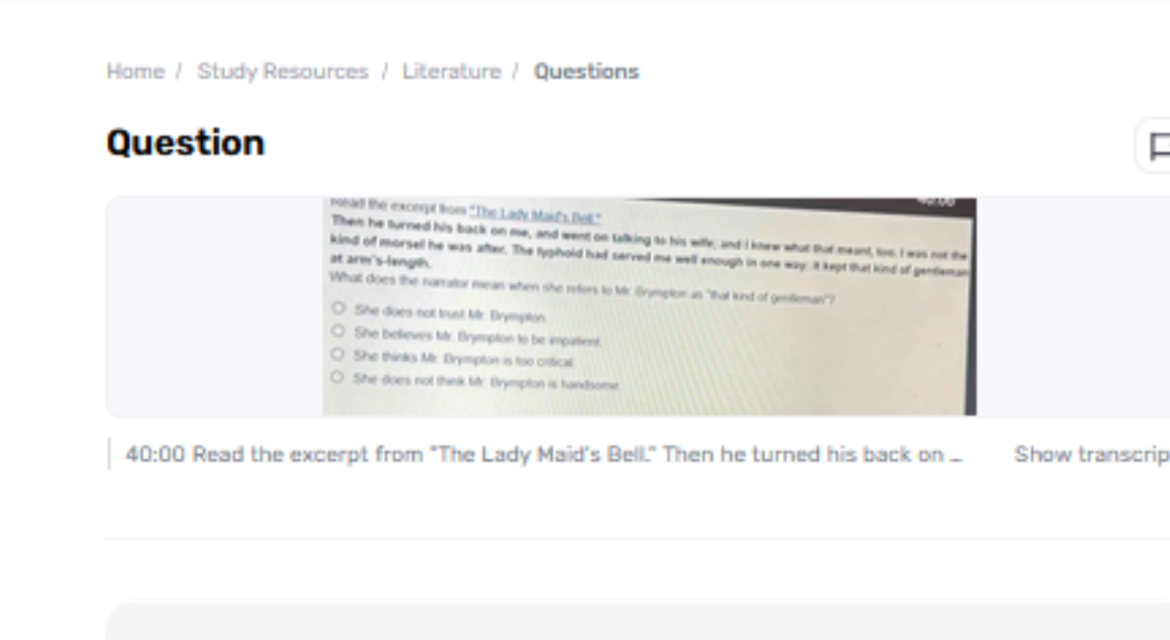In the account, the storyteller refers to Mr. Brympton as “that kind of man of his word,” a state stacked with feedback of his character and social standing. This critique proposes that Mr. Brympton epitomizes the shallow characteristics ordinary of the Victorian gentleman course, missing genuine ideals or profundity.
This characterization serves as a lens through which the novel investigates societal standards and the genuineness of individual connections inside the setting of Victorian society.
The Victorian Gentleman: An Archetype
To understand the critique inserted within the state “that kind of gentleman,” it is essential to grasp the original of the Victorian honorable man. The Victorian period set colossal esteem on social status, propriety, and open discernment. A gentleman was expected to follow strict codes of conduct, what does the narrator mean when she refers to mr. brympton as “that kind of gentleman”? counting politeness, respectability, and a certain ethical compass. In any case, these desires are often driven to a shallow adherence to societal standards, where the appearance of ideals was in some cases more critical than the real ownership of it.
Mr. Brympton’s Character
The narrator’s reference to Mr. Brympton as “that kind of gentleman” recommends that he fits this superficial shape. Mr. Brympton follows the outward traditions of his course but may need the more profound qualities that constitute genuine ethical judgment. This critique isn’t almost about Mr. Brympton as an individual but amplifies to the broader social course he speaks to. It infers that numerous Victorian honorable men, like Mr. Brympton, might prioritize appearances over substantive virtue.
Superficial Characteristics and Need of Profundity
Mr. Brympton’s superficial characteristics are highlighted through his intelligence and the narrator’s observations. His behavior is characterized by a strict adherence to societal desires without a comparing profundity of character. For occasion, he may show courteousness and a sense of obligation in public, but his private activities uncover a need of veritable concern for others. This division between open persona and private behavior underscores the study of the Victorian man of his word as more performative than true.
Critique of Societal Norms
The narrator’s use of “that kind of gentleman” serves as an editorial on the societal standards and desires of the time. Victorian society set critical weight on people to comply with particular parts, regularly at the cost of individual realness. The novel employments Mr. Brympton’s character to investigate the pressure between societal desires and individual integrity. By critiquing Mr. Brympton, the storyteller challenges the peruser to address the genuine esteem of social status and the cost of maintaining appearances.
Topics of Social Class and Individual Genuineness
The phrase “that kind of gentleman” encapsulates broader subjects inside the novel, especially the complexities of social course and personal genuineness. The Victorian gentleman may be an image of a rigid social chain of command that values appearance over substance. Through Mr. Brympton, the novel dives into the exchange between social character and individual realness, addressing whether genuine ideals can exist inside such a constrained system.
Suggestions for Individual Connections
Mr. Brympton’s superficial nature has significant suggestions for his connections. The need for veritable ideals and depth implies that his connections are likely to be shallow and performative. This reflects a broader study of Victorian society, where social interactions are regularly represented by strict traditions instead of veritable emotional associations. The narrator’s critique recommends that the accentuation of social status and outward appearances can lead to hollow relationships, destitute of genuine intimacy and understanding.
The Narrator’s Basic Viewpoint
The narrator’s perspective is pivotal in forming the reader’s understanding of Mr. Brympton and the societal standards he speaks to. By referring to him as “that kind of gentleman,” the storyteller certainly studies the values of the Victorian gentleman’s lesson. This basic point of view welcomes the reader to address the validity of these societal standards and consider the significance of individual keenness over social similarity.
Broader Topics within the Novel
The critique of Mr. Brympton adjusts with the novel’s broader subjects of social lesson, genuineness, and the nature of ideals. The account investigates how societal desires can compel individual character and lead to a shallow presence. Through characters like Mr. Brympton, the novel questions whether genuine ethicalness and depth of character can flourish inside a society that prioritizes appearances and social status.
How to Utilize Gauth in Three Steps
With these three steps, you’ll use Gauth to handle your homework issues effectively and successfully, ensuring you understand each solution and can apply the information freely.
Step 1: Submit Your Question
- Sort or Transfer Your Address: Explore the Gauth stage and either sort your address specifically into the input field or transfer an image of the address.
- Drag and Drop or Tap to Transfer: Utilize the drag-and-drop highlight to transfer pictures or tap the assigned zone to browse and select the record from your gadget.
Step 2: Get Your AI-Powered Arrangement
- AI Answer Generation: Gauth AI innovation will rapidly analyze the submitted address and produce an arrangement.
- Step-by-Step Arrangements: Get clear, step-by-step tackling steps that direct you through the arrangement handle.
- Detailed Clarifications: Get the rationale behind each step with detailed clarifications and how and why tips.
Step 3: Get to Guide Services (Optional)
- Interface with Genuine Specialists: If advance help is required, interface with one of Gauth thousands of genuine specialists who are accessible 24/7.
- Quick Solutions for Difficult Issues: For the top 5% most troublesome issues, get arrangements in as little as 10 minutes from proficient guides.

Conclusion
The phrase “that kind of gentleman” serves as a capable critique of Mr. Brympton’s character and the social course he speaks to. It proposes that he epitomizes the shallow characteristics normal of the Victorian man of his word, missing genuine ideals or profundity. This critique expands to the broader societal standards of the Victorian period, addressing the esteem of social status and the realness of individual connections inside such a compelled system. Through Mr. Brympton, the novel investigates the complexities of social class, individual astuteness, and the pressure between societal desires and individual genuineness.

